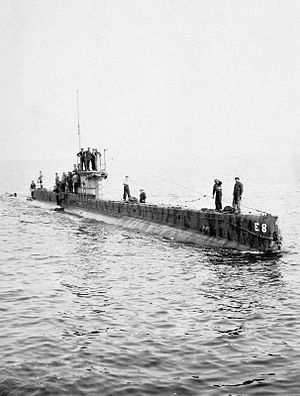HMS E8

| |
| History | |
|---|---|
| Name | HMS E8 |
| Builder | HM Dockyard, Chatham |
| Cost | £105,700 |
| Laid down | 30 March 1912 |
| Commissioned | 18 June 1914 |
| Fate | Scuttled, 4 April 1918 |
| General characteristics | |
| Class and type | E-class submarine |
| Displacement |
|
| Length | 178 ft (54 m) |
| Beam | 15 ft 5 in (4.70 m) |
| Propulsion |
|
| Speed |
|
| Range |
|
| Complement | 31 |
| Armament | 4 × 18 inch (450 mm) torpedo tubes (1 bow, 2 beam, 1 stern) |
HMS E8 was a British E-class submarine built at Chatham Dockyard. She was laid down on 30 March 1912 and was commissioned on 18 June 1914. She cost £105,700. During World War I she was part of the British submarine flotilla in the Baltic.
Design
The early British E-class submarines, from E1 to E8, had a displacement of 652 tonnes (719 short tons) at the surface and 795 tonnes (876 short tons) while submerged. They had a length overall of 180 feet (55 m) and a beam of 22 feet 8.5 inches (6.922 m), and were powered by two 800 horsepower (600 kW) Vickers eight-cylinder two-stroke diesel engines and two 420 horsepower (310 kW) electric motors.[1][2] The class had a maximum surface speed of 16 knots (30 km/h; 18 mph) and a submerged speed of 10 knots (19 km/h; 12 mph), with a fuel capacity of 50 tonnes (55 short tons) of diesel affording a range of 3,225 miles (5,190 km; 2,802 nmi) when travelling at 10 knots (19 km/h; 12 mph), while submerged they had a range of 85 miles (137 km; 74 nmi) at 5 knots (9.3 km/h; 5.8 mph).[1]
The 'Group 1' E class boats were armed with four 18 inch (450 mm) torpedo tubes, one in the bow, one either side amidships, and one in the stern; a total of eight torpedoes were carried. Group 1 boats were not fitted with a deck gun during construction, but those involved in the Dardanelles campaign had guns mounted forward of the conning tower while at Malta Dockyard.[1]
E-Class submarines had wireless systems with 1 kilowatt (1.3 hp) power ratings; in some submarines, these were later upgraded to 3 kilowatts (4.0 hp) systems by removing a midship torpedo tube. Their maximum design depth was 100 feet (30 m) although in service some reached depths of below 200 feet (61 m).[1]
Crew
E8′s complement was three officers and 28 men.[1]
Service history
On 5 August 1914, the destroyers HMS Ariel and HMS Amethyst towed E8 and HMS E6, respectively to Terschelling. E8 and E6 then made the first Heligoland Bight patrol of World War I.[3]
On 23 October 1915, E8 sank the 9,050-ton, three-funnel German armoured cruiser SMS Prinz Adalbert 20 nautical miles (37 km) in the Baltic Sea west of Libau. As the result of this action the submarine's commander, Commander Francis Goodhart, received the Cross of St. George from Tsar Nicholas II.[4] During her time in the Baltic, Aksel Berg, who later became the founder of Soviet cybernetics, was her liaison officer.[5]
Fate
E8 met her fate on 4 April 1918 outside Helsingfors (now Helsinki) 1.5 nautical miles (2.8 km) off Harmaja Light in the Gulf of Finland. She was scuttled by her crew, along with E1, E9, E19, C26, C27, and C35 to avoid seizure by advancing German forces who had landed nearby.
E8 was salvaged in August 1953 for breaking up in Finland.
References
- ^ a b c d e Akerman, P. (1989). Encyclopaedia of British submarines 1901–1955. p.150. Maritime Books. ISBN 1-904381-05-7
- ^ "E Class". Chatham Submarines. Retrieved 20 August 2015.
- ^ Keyes, Sir Roger (1934). The Naval Memoirs of Admiral of the Fleet Sir Roger Keyes. Vol. 1: The Narrow Seas to the Dardanelles 1910-1915. London: Thornton Butterworth. p. 68.
- ^ Tall, J.J; Paul Kemp (1996). HM Submarines in Camera An Illustrated History of British Submarines. Sutton Publishing. p. 32. ISBN 0-7509-0875-0.
- ^ "CHATHAM BUILT SUBMARINES: E8 Crew List". www.csubmarine.org. Archived from the original on 7 September 2012. Retrieved 22 November 2009.
- Submarines, War Beneath the Waves, from 1776 to the Present Day, by Robert Hutchinson ISBN 978-0-06-081900-2
External links
 Media related to HMS E8 at Wikimedia Commons
Media related to HMS E8 at Wikimedia Commons
- British E-class submarines of the Royal Navy
- Ships built in Chatham
- 1913 ships
- World War I submarines of the United Kingdom
- World War I shipwrecks in the Baltic Sea
- Royal Navy ship names
- Maritime incidents in 1918
- Shipwrecks of Finland
- Scuttled vessels of the United Kingdom
- United Kingdom military submarine stubs
